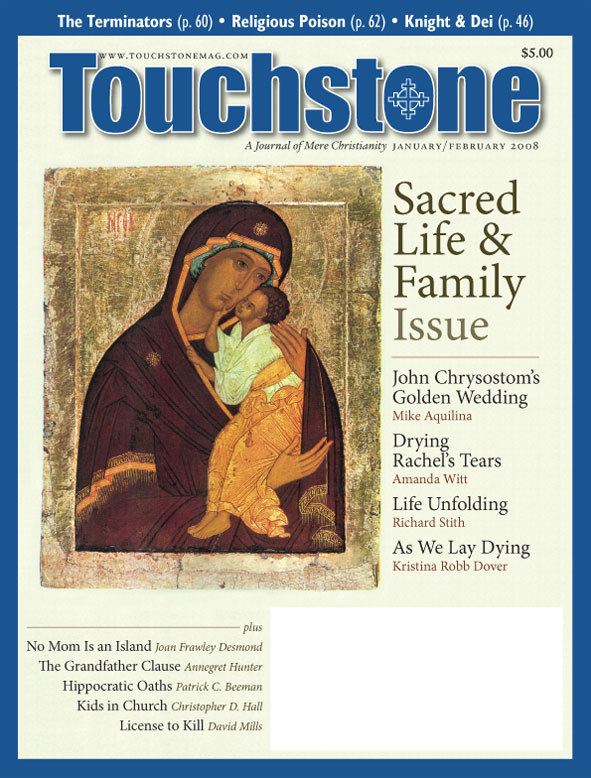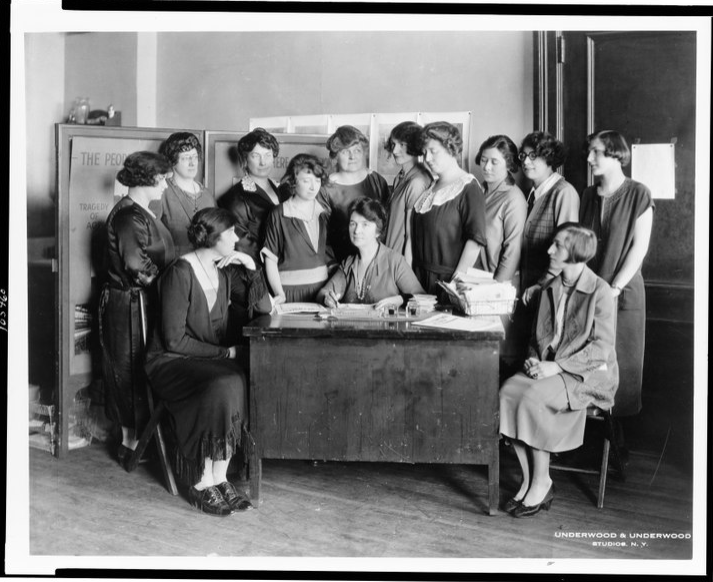License to Kill
The Persistence of Abortion & the Responsibilities of Christians
In an essay titled “Like a slave, is an unborn child not a brother?”, published in October in the English newspaper the Telegraph, Charles Moore reflected on the opening of a museum exhibition on the history of slavery and asked how curators of a similar exhibit might see abortion in 200 years.
He imagined a museum buying a hospital and showing visitors “how, in one ward, staff were trying to save the lives of premature babies while, in the next, they were killing them.” The museum
could compare the procedure by which the corpse of a baby who had died after or during premature birth was presented by the hospital to the mother to assist with grieving, with the way a similar corpse, if aborted, was thrown away. It could display the various instruments that were used to remove and kill the foetus, rather as the manacles and collars of slaves can be seen today.
He ended his essay with the argument that “with the passage of time, abortion, especially late abortion, is slowly coming to be seen as a ‘solution’ dating from an era that is passing. It will therefore be discredited.”
Systemic License
I hope he is right, but the drive for—the need for, desire for, addiction to—sexual license is so great, and therefore the need for abortion so great, that abortion’s coming to be seen as outdated strikes me as unlikely, even two hundred years in the future.
Because contraception sometimes fails, women will get pregnant when they don’t want to be, or when their husbands or boyfriends don’t want them to be. A lot of these mothers will choose to abort their children. If you want sexual -pleasures without marriage, or want them within marriage without unexpected children—if you want intimacy without consequences—you must have some way to make the inevitable consequences disappear.
Abortion is the only widely accepted solution to the problem of children their mothers don’t want or at least won’t keep. The most the mainstream has done is try to make the need for abortion rarer by promoting contraception (some methods of which are abortifacient anyway) or to make abortion easier and more private, with morning-after pills and chemical abortions at home. But a society in which babies can be aborted with a pill and every abortuary has closed down is still a society in which unborn children are killed. That is not an improvement.
Abortion cannot become outdated until license has become outdated, and I see no reason to believe that sexual license is part of an era that is passing. Surveys keep showing that young people are more pro-life than their parents, but they are also more sexually abandoned than their parents—or, if that is unfair to them, certainly more fertile and less cautious—and in the end, for most, self-interest will trump belief.
And too many people have invested too much money in enterprises that depend upon the constant stimulation of sexual appetite for us to imagine society reversing its course. License is systemic because it is profitable, and because its enormous social costs are harder for the average man to see than its (apparent but delusory) immediate personal benefits.
Moore expects a natural evolution in the Western moral conscience, the kind that brought an end to slavery. But consciences don’t evolve so much as they are formed.
Slavery did not disappear because men in general came to see its wickedness. It was defeated in England by committed and untiring, and in the terms of the day un-p.c., Christians working within the political structures, aided by a revival and a reformation in manners pursued by the same group of committed and untiring, and in the terms of the day un-p.c., Christians, which increased the movement’s natural support and (we can safely presume) increased the moral sensitivity of the voting population as a whole.
Abortion will only be seen as outdated when chastity, or at least continence, is the social norm, but unborn life might be legally protected before then. We have, as always, the same double responsibility: to the protection of the unborn through the legal and political processes, which include, as the editors have argued before, the refusal to cooperate materially with evil by supporting pro-abortion candidates, and to the reformation of manners.
A Compelling Life
The second is a calling at once more difficult and much easier. More difficult, because it demands more of us, but much easier because it gives us things we can do, whose effect we can see.
You don’t have to rent the movie or watch the television show whose appeal is primarily salacious, and you can talk with your neighbors about the effect upon them and their families when they do. You can teach your children modesty in speech and dress and expect it of those who visit your home. You can make more obvious in your marriage the joys and pleasures of fidelity and the rewards of sacrifice. You can be open to life.
You can make heroes of those who model purity. You can use that odd-sounding word “purity” in conversation in the same way you use words like “excellence” and “beauty,” as if it were the most natural word to use, and not in the embarrassed inverted commas with which most of us would use it.
You can do a great deal for the reformation of manners that must be the second half of the work for life in our culture. It will not replace political effort, but millions of Christians living chastely will witness to a vision of life, a desirable kind of life (for the pleasures of license pall, even for the addicts), that will make the political defense of life more compelling to more people.
— David Mills, for the editors
Moore’s article can be found at www.telegraph.co.uk/opinion/main.jhtml?xml=/opinion/2007/10/27/do2702.xml.
David Mills has been editor of Touchstone and executive editor of First Things.
subscription options
Order
Print/Online Subscription

Get six issues (one year) of Touchstone PLUS full online access including pdf downloads for only $39.95. That's only $3.34 per month!
Order
Online Only
Subscription

Get a one-year full-access subscription to the Touchstone online archives for only $19.95. That's only $1.66 per month!
bulk subscriptions
Order Touchstone subscriptions in bulk and save $10 per sub! Each subscription includes 6 issues of Touchstone plus full online access to touchstonemag.com—including archives, videos, and pdf downloads of recent issues for only $29.95 each! Great for churches or study groups.
Transactions will be processed on a secure server.
more on abortion from the online archives
more from the online archives
calling all readers
Please Donate
"There are magazines worth reading but few worth saving . . . Touchstone is just such a magazine."
—Alice von Hildebrand
"Here we do not concede one square millimeter of territory to falsehood, folly, contemporary sentimentality, or fashion. We speak the truth, and let God be our judge. . . . Touchstone is the one committedly Christian conservative journal."
—Anthony Esolen, Touchstone senior editor












